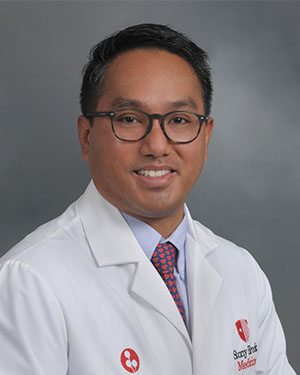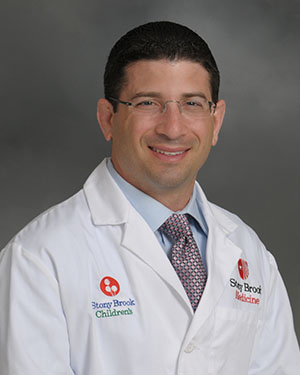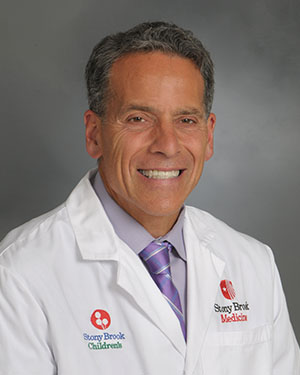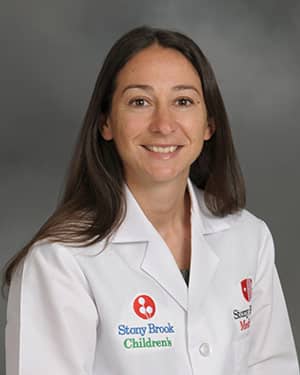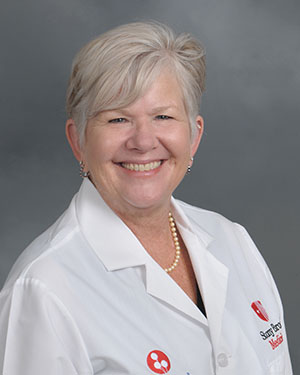Navigation Pediatric Cardiology
Pediatric Cardiology
Caring for children with heart problems is one of our specialties at Stony Brook Children's.
Our team of board certified pediatric cardiologists see more than 2,000 pediatric patients and 650 fetal patients per year. Common reasons for referral include concerns for congenital heart disease, arrhythmia or acquired heart disease. We have a Fetal Heart Program, a multidisciplinary program that helps coordinate the care for families affected by fetal heart disease.
Services
Our scope of services includes advanced diagnostics; long-term management of cardiovascular diseases in infants, children and adolescents; adults with congenital cardiac defects; and cardiovascular defects in the fetus.
Advanced Diagnostics
Stony Brook Children’s provides state-of-the-art pediatric cardiac imaging in our new echocardiography laboratory. This facility is equipped with the latest technology and is staffed by highly skilled pediatric cardiology imaging experts. The imaging lab offers safe, non-invasive, pain-free testing in a soothing, family-centered environment.
Most patients are referred by their primary care physician, who may have noticed something unusual that needs a specialist's evaluation. Examples include heart murmurs, rapid breathing, high blood pressure, certain infections, chest pain, heart rhythm irregularities, fainting episodes or questions about participation in sports. We also see pregnant women referred by their obstetrician to identify some congenital defects prenatally, as early as 16 to 18 weeks of gestation. This allows us to educate the family about prognosis and make informed decisions about the management of the baby at and after birth.
All patients receive a thorough history and examination, and frequently an EKG (electrocardiogram) and ECHO (echocardiogram). In most cases, serious heart disease can be definitively excluded based on this evaluation alone. If more specialized tests are required, an array of noninvasive or minimally invasive options are available, including:
- Ambulatory EKG
- Echocardiography
- Transesophageal echocardiography
- 3-Dimensional echocardiography
- Exercise stress testing
- Fetal echocardiography
- Cardiac MRI
- Cardiac CT
Long-Term Management
Many heart problems in childhood may need treatment and monitoring only for a limited time. Other problems may require extended care and management into adulthood. Stony Brook Children's and Stony Brook Medicine coordinate a multidisciplinary treatment and follow-up program for adults with congenital heart disease.
Our Team
Our pediatric cardiology core team consists of five highly skilled pediatric cardiologists and an experienced pediatric nurse practitioner. They work collaboratively and with colleagues to identify heart diseases, develop and implement a plan of treatment that meets the patient's and family's unique needs, and coordinate follow up — working with a patient from infancy through adulthood.
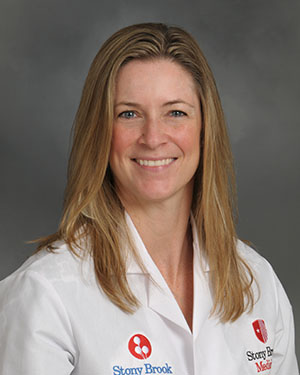
Locations
For Fetal Echo appointments, call (631) 444-2725
Lake Grove Advanced Pediatric Care
4 Smith Haven Mall, Suite 101Lake Grove, NY 11755
(631) 444-KIDS (5437)
Fax: (631) 444-4990
Commack Advanced Pediatric Care
500 Commack Road, Suite 104Commack, NY 11725
(631) 444-KIDS (5437)
Fax: (631) 638-0157
Patient Stories
The Pediatric Cardiology Team doesn’t just take care of children’s hearts. We take care of the whole family by providing support, guidance and information to make sure you fully understand your child’s condition, what the future holds and what we can do to provide the best possible outcome.
Talking about the care we provide is one thing, but introducing you to the children who have been impacted by this care is another. Here are some of the patients who have benefited from treatment by the Pediatric Cardiology Team at Stony Brook Children’s.
Patient Resources
Stony Brook Children's cardiology division includes a pediatric nurse practitioner, Marybeth Heyden, DNP, who works closely with families to help them understand and cope with their child's diagnosis.
Marybeth serves as the care coordinator for two different multidisciplinary programs:
- Fetal Heart Program (FHP): The fetal heart program was established to help support and educate the parents of a child prenatally diagnosed with a heart problem. This multidisciplinary team helps the family obtain crucial information about their child’s diagnosis and works closely with the OB and neonatology to ensure a safe delivery plan for the baby.
- Coordinated Fetal Care Program (CFCP): The coordinated fetal care program was established to help support and educate the parents of any child diagnosed with a medical problem prenatally. This multidisciplinary program includes experts in pediatric cardiology, maternal fetal medicine, neonatology, pediatric surgery and pediatric surgical subspecialties (orthopedics, urology, neurosurgery), genetics, neurology, nephrology, endocrinology, hematology and palliative care. The CFCP aims to coordinate the care needed for these complex pregnancies, to optimize communication among the care team and to ensure that the family feels well supported and informed. The CFCP team works together to ensure a safe delivery plan for the baby.
Advances and Recognitions
Echocardiography Accreditation
The Pediatric and Fetal Echocardiography Laboratory at Stony Brook Medicine is accredited by the Intersocietal Commission for the Accreditation of Echocardiography Laboratories (ICAEL) for Pediatric Transthoracic and Fetal Echocardiography. Accreditation status signifies that the lab has been reviewed by an independent agency which recognizes Stony Brook's commitment to quality testing for the diagnosis of heart disease in children.
Stony Brook is one of only a handful of Pediatric Echocardiography Labs on Long Island to be accredited by ICAEL.
Definitions
Congenital means "present at birth." A congenital heart defect can involve any of many types of malformations of the heart or the large blood vessels near the heart. Cardiac malformations are the most common major birth defect in babies, affecting about 8 in 1,000 newborns. Less severe congenital heart defects may not be noticeable at birth, but are discovered as a child is growing up or in adulthood. Congenital heart defects have varying degrees of severity. Some have no impact on a child's health, while others may require treatment or monitoring for a limited time, and some require extended monitoring and care into adulthood.
In children, the most common acquired heart diseases (those not present at birth) include mucocutaneous lymph node syndrome (Kawasaki's), hypertension, abnormal heart rhythms, heart injury due to infections or viruses, or endocarditis (inflammation of the heart lining.)
Records the electrical activity of the heart during daily activities with a small portable device.
When used diagnostically, it examines the inside of the heart's blood vessels using special X-rays called angiograms. Contrast visible by X-ray is injected into blood vessels using a thin hollow tube called a catheter. Interventional catheterization involves using the catheter to reach the heart with microtools that can be used to close holes, occlude vessels or clear obstructions.
A handheld device is placed on the chest and uses inaudible sound waves (ultrasound) to create images of the heart and blood vessels.
Uses a probe passed with sedation into the esophagus to better image the heart.
Additional transducers (soundwave producers) and computer processing to create detailed 3-D moving images of the heart.
Magnetic resonance imaging used to create 2-dimensional and 3-dimensional images of the heart and vessels.
Uses short bursts of X-rays to create images of the heart and vessels. Our high speed multislice scanners keep radiation dose to a minimum.
A monitor with electrodes is placed on the skin to record the heart's activity during exercise.
Like echocardiography, this procedure involves ultrasound but performed on a pregnant woman to visualize the fetuses' heart structure. Requiring specialized training and skill, fetal echo has a high rate of identifying heart defects, which can be lifesaving in planning appropriately for labor, delivery and therapies.
A high level of lipids (fats) in the bloodstream, which increases the risk of coronary artery disease.
Tests that don't involve inserting needles, instruments or fluids into the body.
Procedures that may include a needle prick for a blood test or shot, insertion of a tube, device or scope.
Procedures that involve surgery.

